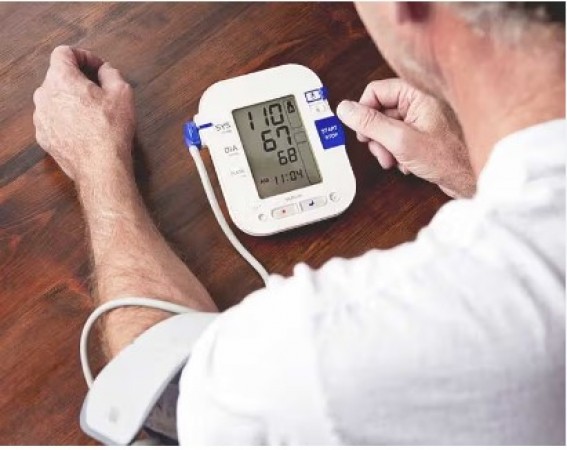
High blood pressure, also known as hypertension, is a common yet serious health issue that can lead to severe complications if not managed properly. Let's dive into simple and effective strategies to keep your blood pressure in check.
High blood pressure is when the force of blood against your artery walls is consistently too high. It can cause heart disease, stroke, and other health problems.
High blood pressure often shows no symptoms, earning it the nickname "silent killer." Left unchecked, it can damage your heart, brain, kidneys, and eyes.
If your family has a history of hypertension, you might be at a higher risk. It's crucial to monitor your blood pressure regularly.
Poor diet, lack of exercise, smoking, and excessive alcohol consumption can increase your risk of developing high blood pressure.
As you age, the risk of high blood pressure increases. Men are more likely to develop it before age 55, while women are more likely to develop it after menopause.
Eating a diet rich in fruits, vegetables, whole grains, and lean proteins can help lower your blood pressure. Aim for a variety of nutrients.
Too much salt can raise your blood pressure. Opt for low-sodium alternatives and be mindful of hidden salts in processed foods.
Potassium helps balance the amount of sodium in your cells. Foods like bananas, potatoes, and spinach are great sources.
Regular physical activity strengthens your heart, enabling it to pump blood with less effort. Aim for at least 150 minutes of moderate exercise per week.
Incorporate aerobic exercises like walking, jogging, swimming, or cycling. Resistance training can also help.
Stick to a regular exercise schedule. Even small changes, like taking the stairs instead of the elevator, can make a difference.
Stress can cause temporary spikes in blood pressure. Techniques like meditation, deep breathing exercises, and yoga can help manage stress.
Regular mindfulness practice can reduce stress and improve overall well-being. Try apps or guided sessions if you're new to meditation.
Ensure you get 7-9 hours of quality sleep each night. Poor sleep can negatively impact your blood pressure.
Carrying extra weight around your midsection increases your risk of high blood pressure. Monitor your waistline and maintain a healthy weight.
Eat the right amount of calories based on your activity level. Avoid overeating and opt for nutrient-dense foods.
Consult a nutritionist or dietitian for personalized advice on maintaining a healthy weight.
Drinking too much alcohol can raise your blood pressure. Limit your intake to moderate levels—up to one drink per day for women and two for men.
Caffeine can cause short-term spikes in blood pressure. Pay attention to how much caffeine you consume from coffee, tea, and energy drinks.
Drink plenty of water throughout the day. Staying hydrated helps your body function optimally.
Smoking damages your blood vessels and raises your blood pressure. Seek support to quit smoking and explore nicotine replacement therapies.
Even secondhand smoke can contribute to high blood pressure. Make your home and car smoke-free zones.
The benefits of quitting smoking start almost immediately and can significantly improve your overall health.
Regularly check your blood pressure at home or have it checked by a healthcare professional. Keep a log to track your progress.
Schedule regular check-ups with your doctor to monitor your overall health and catch any issues early.
Understand what your blood pressure numbers mean and strive to keep them within the recommended range.
If lifestyle changes aren't enough, your doctor may prescribe medication to help control your blood pressure. Follow their instructions carefully.
Take your medications as prescribed, even if you feel fine. Skipping doses can cause your blood pressure to spike.
Talk to your doctor about any side effects you experience. They may adjust your dosage or try a different medication.
Incorporate foods that support heart health, such as oily fish, nuts, seeds, and avocados.
Trans fats can raise your blood pressure and cholesterol. Check food labels and avoid products with partially hydrogenated oils.
Find ways to stay active throughout the day. Take breaks to stretch, walk around your office, or do some light exercises at home.
Keep up with the latest research and guidelines on managing high blood pressure. Knowledge is power.
Educate your family and friends about the importance of maintaining healthy blood pressure. Support each other in making positive changes.
Consider joining a support group for people with high blood pressure. Sharing experiences and tips can be very helpful.
Invest in a reliable blood pressure monitor to keep track of your readings at home.
Use health apps to track your diet, exercise, and medication. Many apps can provide reminders and motivational tips.
Explore reputable websites and online communities for advice, recipes, and support.
Set realistic, achievable goals for your diet, exercise, and lifestyle changes. Celebrate your progress, no matter how small.
Remember that managing blood pressure is a long-term commitment. Stay patient and consistent.
Don't hesitate to seek support from family, friends, or healthcare professionals. You're not alone in this journey.
Taking proactive steps to manage your blood pressure can significantly improve your quality of life. Start today and make healthy choices.
A positive mindset can go a long way. Believe in your ability to make lasting changes and maintain a healthy lifestyle.
Keep striving for improvement. Your health is worth the effort, and every small step counts.
Indian Entrepreneurs Shine on Forbes 30 Under 30 Asia List , Who Are They?
Kapil Sibal Elected President of Supreme Court Bar Association